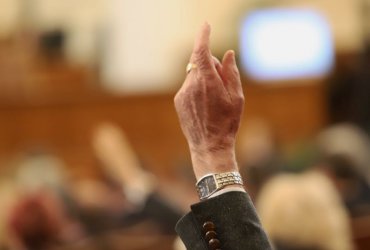
In an arguably unprecedented parliamentary drama, MPs did not pass the bill defining state subsidies for political parties for 2020. After a break, and some very heated debates the speaker initiated a third vote. MPs may vote for the same bill only twice within a single session, but speaker Tsveta Karayancheva said the “rules cannot foresee every real-life situation.” Тhus she produced a third vote. The legality of the procedure notwithstanding, MPs finally agreed to the opposition’s proposal for an eight-leva per vote subsidy for political parties in 2020.
The state subsidies for political parties pass a vote every year as part of the bundle of motions regarding the state budget for the coming year. State financial aid for political parties rarely produces news during the voting process as every year MPs pass a motion for the same amount - 12 or 13 leva per vote. The issue has received traction from outside Parliament, however. Salvi Trifonov, the former TV show host turned network owner and politician, has criticized the subsidy for many years, calling for MPs to cut it to one lev per vote.
The problem, as many observers have noted over the years, is that reducing the subsidies to a symbolic amount, first, produces a grave inequality between parties: smaller players could not support themselves, and two, opens the door for even greater dependency to private actors.
In a surprise move this June the majority passed a motion to cut the subsidies to 1 lev per vote. MPs from the ruling party and coalition partners approved the bill and the financial support for political parties from the state budget was radically reduced. In addition, MPs passed another motion: they lifted the limits to which political parties may receive financial aid from private businesses.
The Organization for Security and Co-operation in Europe has since recommended that Parliament reverse the changes.
But, the bills regarding the state budget get an annual vote. As the issue had become anything but trivial since the summer of this year, the debates in Parliament were heated.
The opposition, the Bulgarian Socialist Party, which voted against the cut in June, now proposed an eight-leva per vote state subsidy. Sources from BSP and ruling party GERB told Mediapool that GERB will support the proposal. Later, though, Financial Minister Vladislav Gouranov denies having any knowledge of about such an agreement. GERB MPs refused to comment on the record, as did the leader of the opposition, Korneliya Ninova.
The leader of the Movement for Rights and Freedoms (DPS) spoke to reporters about such a deal which ultimately might have led to its undoing.
During the vote GERB and DPS and VOLYA voted against, which was enough to stop it. Then the majority tabled a one-lev per vote bill, which also did not receive enough support because of DPS, who voted against both proposals. As the procedure allows only two votes, this left the state subsidies in a limbo. During the break parties and cabinet embarked on intense debates which ended with GERB finally agreeing to the opposition’s proposal. The speaker announced a third vote and – with the votes of the opposition and GERB the eight-leva per vote subsidy was approved.
mediapool.bg

 България | Пет, 03 Май 2024г. 16:32ч. | Над 40 хил. кутии контрабандни цигари са задържани на "Лесово"
България | Пет, 03 Май 2024г. 16:32ч. | Над 40 хил. кутии контрабандни цигари са задържани на "Лесово"